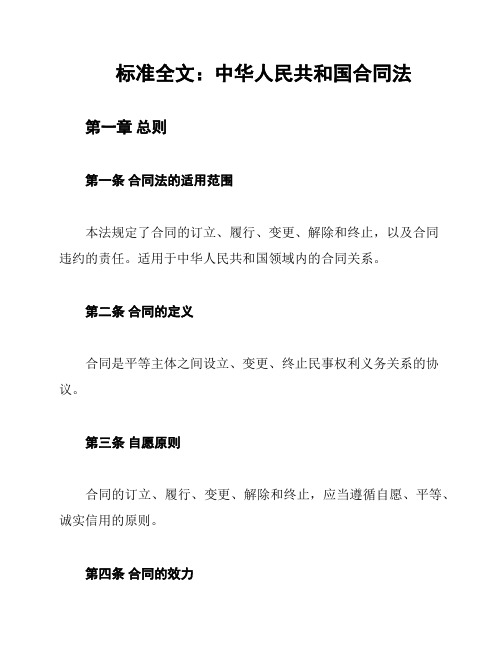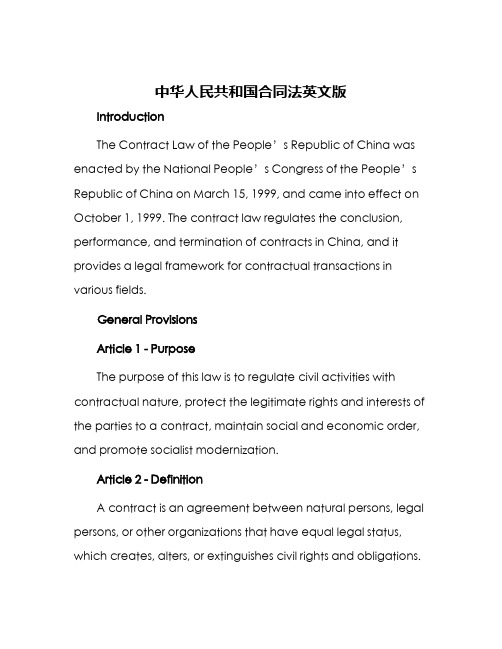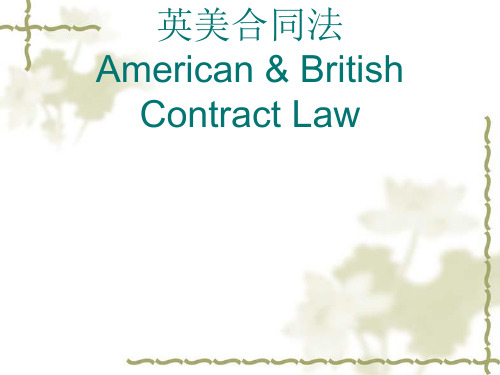Contract Law 合同法
合同法冷静期相关条例

合同法冷静期相关条例英文回答:Cooling-Off Periods in Contract Law.A cooling-off period is a period of time after a contract is signed during which the consumer can cancel the contract without penalty. Cooling-off periods are typically required by law for certain types of contracts, such as home improvement contracts, door-to-door sales contracts, and credit card contracts.The purpose of a cooling-off period is to give consumers time to reconsider their decision to enter into a contract. During the cooling-off period, consumers can review the contract, consult with an attorney, or simply change their mind. If the consumer decides to cancel the contract, they can do so without having to pay any fees or penalties.The length of the cooling-off period varies from state to state. In most states, the cooling-off period is three days. However, some states have longer cooling-off periods for certain types of contracts. For example, in California, the cooling-off period for home improvement contracts is ten days.To cancel a contract during the cooling-off period, the consumer must send written notice to the other party. The notice must be sent within the cooling-off period and must state that the consumer is canceling the contract.Cooling-off periods are an important consumerprotection measure. They give consumers time to make informed decisions about whether to enter into a contract. Cooling-off periods also help to protect consumers from unscrupulous businesses that use high-pressure sales tactics.中文回答:合同法中的冷静期相关条例。
标准全文:中华人民共和国合同法

标准全文:中华人民共和国合同法第一章总则第一条合同法的适用范围本法规定了合同的订立、履行、变更、解除和终止,以及合同违约的责任。
适用于中华人民共和国领域内的合同关系。
第二条合同的定义合同是平等主体之间设立、变更、终止民事权利义务关系的协议。
第三条自愿原则合同的订立、履行、变更、解除和终止,应当遵循自愿、平等、诚实信用的原则。
第四条合同的效力合同自成立时生效,对当事人具有法律约束力。
第二章合同的订立第五条订立合同的形式合同可以采取口头形式,也可以采取书面形式。
法律、行政法规规定必须采取书面形式的,应当采取书面形式。
第六条订立合同的能力订立合同的当事人应当具有相应的民事权利能力和民事行为能力。
第七条订立合同的目的和合法性订立合同的当事人应当遵守法律、行政法规,尊重社会公德,不得损害社会公共利益。
第八条订立合同的方式合同的订立应当采取要约、承诺的方式。
第三章合同的履行第九条履行合同的原则当事人应当按照约定履行合同义务,遵循诚实信用原则,根据合同的性质、目的和交易习惯履行通知、协助、保密等义务。
第十条履行合同的期限当事人应当按照约定的期限履行合同义务。
没有约定或者约定不明确的,根据合同的性质、目的和交易习惯确定。
第十一条履行合同的质量当事人应当按照约定的质量履行合同义务。
没有约定或者约定不明确的,按照国家标准、行业标准履行;没有国家标准、行业标准的,按照通常标准或者符合合同目的的特定标准履行。
第十二条履行合同的数量当事人应当按照约定的数量履行合同义务。
没有约定或者约定不明确的,按照合同标的的性质、交易习惯确定。
第四章合同的变更、解除和终止第十三条合同的变更当事人协商一致,可以变更合同。
第十四条合同的解除当事人协商一致,可以解除合同。
第十五条合同的终止合同的终止有下列情形之一:1. 履行完毕;2. 合同解除;3. 债务相互抵销;4. 债务人依法将标的物提存;5. 债权人免除债务;6. 法律规定或者当事人约定终止的其他情形。
合同法概述

根据合同的成立是否具备一定的形式为要件: 1.要式合同包括: 六个月以上的租赁合同 融资租赁合同 建设合同 技术合同 2.不要式合同
11
根据合同当事人的权利义务分担方式: 1.双务合同 2.单务合同
12
根据合同是否可以独立存在: 1.主合同 2.从合同
13
根据法律上有无一定的名称: 1.有名合同 2.无名合同
我国《合同法》第2条规定:合同是平等主体的自然人、法 人、其他组织之间设立、变更、终止民事权利义务关系的协 议。
3
英国《牛津法律大辞典》将合同定义为“合同是2人 或多人之间在相互间设立合法义务而达成的具有法律 强制力的协议”。
4
美国《合同法重述》将合同定义为“合同是一个允诺 或一系列的允诺,对违反这种允诺,法律将给予其补 偿或将强制其得到实际执行”。
1.基本原则 2.法律渊源
15
1.基本原则
1.合同当事人意思自治原则。又称契约自由原则。 合同当事人可以根据自己的需要,通过协商一致,做 出符合各自愿望和要求的约定,只要这种约定不违反
法律的规定,不损害国家和社会公共利益,对当事人 具有法律约束力。
2.诚实信用原则。也称为“帝王规则”。民事主体 在从事活动时,应诚实守信,以善意的方式履行其义 务,不得滥用权利,规避法律规定的或合同约定的义 务。司法机关在适用法律时,如果没有相应具体法律 规定时,可以根据这一原则做出司法解释,从而解决 法律适用问题。
5
《德国民法典》305条规定“依法律行为设定债务 关系或变更法律关系的,除法律另有规定外,应依当 事人之间的合同”。
6
《法国民法典》1101条规定“合同是一种合意, 依此合意,一人或数人对其他一人或数人负担给付、 作为或不作为的债务”。
合同法第十条 合同编

合同法第十条合同编英文回答:The tenth article of the Contract Law stipulates the requirements for contracts. According to this article, a contract should be formed voluntarily through mutual agreement between the parties involved. This means that both parties must willingly enter into the contract and agree on its terms. Coercion or any form of duress is not allowed in the formation of a contract.In addition, the article states that a contract should have a definite content. This means that the terms and conditions of the contract should be clear and specific. Vague or ambiguous terms may lead to misunderstandings or disputes between the parties. Therefore, it is important for the parties to clearly define their rights and obligations in the contract.Furthermore, the article emphasizes the principle ofgood faith in contract formation. Good faith means that the parties should act honestly and fairly in their dealings with each other. They should not engage in fraudulent or deceptive practices that could undermine the integrity of the contract. Good faith is essential for maintaining trust and confidence between the parties.Moreover, the article highlights the requirement of complying with laws and regulations. A contract should not violate any laws or regulations in force. If a contract is found to be illegal or against public policy, it may be deemed void or unenforceable. Therefore, it is crucial for the parties to ensure that their contract is in compliance with the relevant legal provisions.Lastly, the article states that a contract should not harm the public interest. This means that the terms and conditions of the contract should not be detrimental to the society as a whole. For example, a contract that promotes illegal activities or causes harm to the environment may be considered against public interest. It is important for the parties to consider the broader impact of their contract onsociety.中文回答:合同法第十条规定了合同的要求。
中华人民共和国合同法全文8篇

中华人民共和国合同法全文8篇篇1第一章总则第一条(立法目的)为了保护合同当事人的合法权益,维护社会经济秩序,促进社会主义现代化建设,制定本法。
第二条(合同定义)本法所称合同是平等主体的自然人、法人、其他组织之间设立、变更、终止民事权利义务关系的协议。
第三条(基本原则)合同当事人的法律地位平等,一方不得将自己的意志强加给另一方。
第四条(自愿原则)当事人依法享有自愿订立合同的权利,任何单位和个人不得非法干预。
第五条(公平原则)当事人应当遵循公平原则确定各方的权利和义务。
第六条(诚实信用原则)当事人应当诚实守信,履行自己的义务。
第七条(合法性原则)当事人订立、履行合同,应当遵守法律、行政法规,尊重社会公德,不得扰乱社会经济秩序,损害社会公共利益。
第二章合同的订立第八条(要约和承诺)依法成立的合同,对当事人具有法律约束力。
当事人应当按照约定履行自己的义务,不得擅自变更或者解除合同。
依法成立的合同,受法律保护。
合同的订立,应当遵循要约和承诺的方式。
第九条(格式条款的限制)提供格式条款的一方应当遵循公平原则确定当事人之间的权利和义务,并采取合理的方式提示对方注意免除或者限制其责任的条款,按照对方的要求,对该条款予以说明。
格式条款不得加重对方责任或者排除其主要权利。
对格式条款的理解发生争议的,应当按照通常理解予以解释。
对格式条款有两种以上解释的,应当作出不利于提供格式条款一方的解释。
格式条款和非格式条款不一致的,应当采用非格式条款。
法律规定的其他有关合同订立的内容,依照其规定。
第三章合同的效力第十条(合同的法律效力)具备下列条件的民事法律行为有效:(一)行为人具有相应的民事行为能力;(二)意思表示真实;(三)不违反法律和社会公共利益以及公序良俗的原则。
依法成立的合同自成立之日起生效。
法律另有规定的,依照其规定办理登记手续后生效。
法律对于合同的效力另有规定的,依照其规定办理登记手续后生效的合同除外。
合同效力不受登记手续的影响。
合同法及相关法律知识

要约:希望与他人订立合同的意思表示。 承诺:受要约人同意要约的意思表示。 生效时间:承诺生效时间以到达要约人时确定。 效力:承诺的效果在于使合同成立,即一旦承诺生效,合同便
宣告成立。
合同法律知识
➢ 四、格式条款有不同解释时如何办?
1、格式条款 格式条款是指合同当事人为了重复使用而预先拟定,并在 订立合同时未与对方协商的条款。包含有格式条款的合同 为格式合同。 2、对格式条款有两种以上解释的,应当作出不利于提供 格式条款一方的解释。
以表明使用者在该组织中的成员资格的标志) ④ 证明商标(由对某种商品或者服务具有检测和监督能力的组织注册,而由注册人以外的人使
用于商品或者服务,用以证明该商品或者服务的原产地、原料、制造方法、质量或者其他特 定品质的标志)
知识产权法律制度
3、商标权的取得
① 禁止性规定。 ② 商标权经由注册而取得。 ③ 自然人、法人或者其他组织对自己的商品和服务项目可以申请
01
合同法律知识
Knowledge of Contract Law
合同法律知识
➢ 一、什么是合同?
《合同法》于1999年3月15日九届人大二次会议过, 1999年10月1日起开始实施,此前的三部合同法 《经济合同法》、《涉外经济合同法》、《技术 合同法》同时废止。新《合同法》规定了不少前 三部合同法所未明确的法律制度,了解掌握这部 与经济活动密切相关的重要法典,对于商业风险 的防范、商业利益的维护具有重要的意义。
合法地在市场上使用,但其使用人不享有商标专用权。一般情况下,无权禁止他人使用相同商 标,也无权阻止他人就相同商标提出注册申请。
知识产权法律制度
2、商标的种类
① 商品商标(使用于生产、制造、加工、拣选或者经销的商品上的商标) ② 服务商标(提供服务的经营者在其向社会提供的服务项目上使用的标记,也称为服务标记) ③ 集体商标(以工商业团体、协会或者其他组织名义注册、供该组织成员在工商业活动中使用,
中华人民共和国合同法英文版

中华人民共和国合同法英文版IntroductionThe Contract Law of the People’s Republic of China was enacted by the National People’s Congress of the People’s Republic of China on March 15, 1999, and came into effect on October 1, 1999. The contract law regulates the conclusion, performance, and termination of contracts in China, and it provides a legal framework for contractual transactions in various fields.General ProvisionsArticle 1 - PurposeThe purpose of this law is to regulate civil activities with contractual nature, protect the legitimate rights and interests of the parties to a contract, maintain social and economic order, and promote socialist modernization.Article 2 - DefinitionA contract is an agreement between natural persons, legal persons, or other organizations that have equal legal status, which creates, alters, or extinguishes civil rights and obligations.Article 3 - PrinciplesThe parties to a contract shall follow the principles of fairness, voluntariness, equality, and good faith in concluding, performing, and terminating a contract.Article 4 - Binding ForceA contract shall have binding force on the parties to the contract, and the parties shall perform their obligations in accordance with the contract.Formation of ContractsArticle 9 - OfferAn offer is a proposal made by one party to another party to conclude a contract.Article 10 - AcceptanceAcceptance is an expression of the acceptance of the offer by the offeree.Article 11 - Revocation of OfferAn offer may be revoked if the offeror informs the offeree of the revocation before the offeree has accepted the offer.Article 12 - Lapse of OfferAn offer lapses if it is not accepted within the time limit specified in the offer or within a reasonable time.Article 13 - Modification and Termination of OfferAn offer may be modified or terminated with the consent of the offeree or in accordance with the law.Article 14 - Invalid OffersInvalid offers are offers that lack legality, reality, or voluntariness.Article 15 - Acceptance by ConductAcceptance by conduct is an expression of acceptance by the offeree through his or her conduct.Performance of ContractsArticle 26 - Performance in Accordance with ContractThe parties shall perform their obligations in accordance with the contract.Article 27 - Change of PerformanceIf the circumstances have changed greatly after the conclusion of the contract, and the parties are unable toperform the contract as agreed upon, the parties may renegotiate and modify the contract.Article 28 - Force MajeureIf the performance of a contract is impossible because of force majeure, and the parties are unable to perform the contract even if they have taken necessary measures, the parties may be exempted from liability in accordance with the law.Article 29 - Renunciation of PerformanceIf a party renounces the performance of a contract without justifiable reasons, the other party has the right to request the performance of the contract or to terminate the contract and claim damages.Termination of ContractsArticle 94 - Termination by AgreementThe parties may terminate the contract by agreement.Article 95 - Termination by One PartyIf one party has breached the contract, the other party may terminate the contract and claim damages.Article 96 - Termination Due to Force MajeureIf the performance of a contract has become impossible due to force majeure, the parties may terminate the contract.Article 97 - Termination Due to a Party’s CircumstancesIf a party’s circumstances have changed so greatly that the contract cannot be performed, the other party may terminate the contract.Article 98 - Termination Due to a Third Party’s CircumstancesIf the performance of a contract is impossible due to the circumstances of a third party, the parties may terminate the contract.ConclusionThe Contract Law of the People’s Republic of China provides a legal framework for various contractual transactions in China. The law regulates the conclusion, performance, and termination of contracts, and it protects the legitimate rights and interests of the parties to a contract. The principles of fairness, voluntariness, equality, and good faith shall be followedby the parties to a contract, and the parties shall perform their obligations in accordance with the contract.。
英美合同法

Chapter 1. Formation of Contract
Section 1. Mutual Assent 合意 合意指双方当事人订立合同的意思表示相一 在英美合同法中, 致。在英美合同法中,合意是判断合同约束 力和当事人合同双方权利义务的前提, 力和当事人合同双方权利义务的前提,也是 合同成立的标志。 合同成立的标志。
合同contract源出自于法语contractus,古称 契约。什么是合同?按照最简单的定义(the simplest definition),合同是具有法律约束 力的承诺(A contract is a promise enforceable at law)。 Notwithstanding, not all promises are enforceable, even when in writing. That is why we must learn American&British Contract law
西方早在圣经中就有关于上帝在西乃山与以 色列人立约的记载。诺亚方舟就是借上帝和 诺亚的契约而建造的。 But with thee will I establish my covenant; and thou shalt come into the ark, thou, and thy sons, and thy wife, and thy sons’ wives with thee. 但我要与你立约,你以及你的儿子、妻子和 儿媳,要与你一同进入方舟。
Definition of Contract
Contract Law of China: Contracts referred to in this Law are agreements between equal natural persons, legal persons and other organizations for the purpose of establishing, altering and terminating mutual civil rights and obligations.
- 1、下载文档前请自行甄别文档内容的完整性,平台不提供额外的编辑、内容补充、找答案等附加服务。
- 2、"仅部分预览"的文档,不可在线预览部分如存在完整性等问题,可反馈申请退款(可完整预览的文档不适用该条件!)。
- 3、如文档侵犯您的权益,请联系客服反馈,我们会尽快为您处理(人工客服工作时间:9:00-18:30)。
Contract, as we will use that term, ordinarily connotes an agreement between two or more persons—not merely a shared belief, but a common understanding as to something that is to be done in the future by one or both of them. Sometimes, the term contract is used also to refer to a document—the set of papers in which such an agreement is set forth. For lawyers, contract usually is used to refer to an agreement that has legal effect; that is, it creates obligations for which some sort of legal enforcement will be available if performance is not forthcoming as promised. Thus, it will sometimes be necessary to distinguish among three elements in a transaction, each of which may be called a “contract”: (1) the agreement-in-fact between the parties, (2) the agreement-as-written (which may or may not correspond accurately to the agreement-in-fact), and (3) the set of rights and duties created by (1) and (2). Without trying at this point to state a short but comprehensive definition of law (if that were possible), it is perhaps sufficient to suggest that we will be surveying the ways in which such agreements are made and enforced in our legal system—the role of lawyers and judges in creating contracts, in deciding disputes that may arise with respect to their performance, and in fashioning appropriate remedies for their breach.当我们使用“合同”一词的时候,通常是说它是一份存在于两方或三方之间的契约。
它不是一种简单的信任,而是通常理解为合同的一方或双方在将来要去做的某种事情。
有时候,“合同”也用来指一套包括协议的文件。
对于律师而言,合同通常是指具有法律效力的协议,即设置了一种法律义务,当某行为没有按照预先约定的那样去履行时,可以依照合同去依法强制履行。
因此,有时候,在一次交易中,区分三种不同的因素就变得非常必要,这些因素中的每个因素都可以叫做合同:(1)双方之间的事实合同(2)书面合同,它可能与事实合同不完全一致(3)基于前(1)、(2)两项中合同所产生的权利和义务。
在权利义务问题上,如果情况可以允许,我们可做到不用去努力阐明这种短少但包含法律意义的界定情况,那么它就强烈建议我们在早己设定好的合同和现行法律柜架下的去审视在(订立)创制合同中律师和法官的(角色)作用,他们会解决各方行为引发的争执以及对违约行为以恰当的形式进行补偿。
In the Anglo-American legal system, a great number of things—both tangible and intangible—are susceptible of “ownership.” A bull dozer, a diamond ring, the Empire State Building, “Gone With the Wind”—all may be the “property” of one person or group of persons, which means that the state will protect the right of the“owner” to use, enjoy, and even consume that thing, to the exclusion of all other persons. The first-year property course traditionally focuses on the detailed rules that in Anglo-American law govern the ownership of “real property” (land and the buildings on it), as well as some types of “personal” property, such as “goods” (tangible moveable property). Later you will have the opportunity to explore bodies of law relating to ownership of other, less tangible kinds of property such as copyrights, patents, shares of corporate stock, and negotiable instruments.在英美法律体系中,很多事物—有形的和无形的—都涉及“所有权”问题。
一台推土机、一枚钻戒、帝国大厦、小说《飘》,都可能是一个人或者一些人的财产。
这意味着国家将保护所有权人对其所有物的使用、享受甚至是毁灭的权利,同时排除他人对此行为的干涉。
按照惯例,第一年的财产课程会侧重于英美法律对财产保护的详细规定,诸如土地和地上物等不动产的所有权的细化性规定。
然后,你将会学习到基本是对版权、专利权,股权,可转让票据等无形财产的所有权的法律保护。
Any society that recognizes property rights must also address the question of how it should respond when someone violates those rights. And property rights are not the only kind of individual rights that may need legal protection. Even societies that do not permit private ownership of wealth to the degree that ours does are likely to recognize the personal rights of individuals to be free from certain kinds of conduct such as the infliction of physical injury or other interferences with their individual freedom or dignity. The courses in criminal law and torts deal with different aspects of this question: Criminal law focuses on those violations of personal and property rights that society deems serious enough to be deterred by the threat of punishment for their commission (robbery, rape, and murder are obvious examples); tort law considers what remedy should be made available to the individuals so injured. Because of the nature of the conduct regulated, criminal law and tort law overlap to a great degree, but they are not congruent. Many acts are criminal but not tortious, because they are offenses not against individuals but against the state—treason, for example, or tax evasion; others, such as slander, may be tortious but not criminal.任何社会一旦承认财产的所有权,那么它就必须解决如何处置“侵犯财产权”的问题。
财产权不是由法律简单地保护的一种个体性权利。
甚至,社会不允许财产所有权个人肆意同意他人创设某种随意侵害他人身体或其他有损他人个体自由或者尊严的行为的权利。
关于(财产权的保护)这个问题,刑法和民事侵权行为法有自己有不同的规定:刑法侧重于对个人和财产性权利不受妨害的保护,即社会认为这些犯罪行为的危险性已经严重到须以一系列刑罚惩处方可阻止的程度。
比如抢劫、强奸、谋杀都是明显的例子。
民事侵权法则认为对于个体的伤害应给予有效的赔偿。
由行为在本质上的不同,因此,刑法和民事侵权法即使有很大部分是重合的,但二者并不完全相同。
许多行为由于他们侵犯的不是个体而是国家,因此它们属于民事侵权行为而是刑事犯罪,比如,叛国罪、偷税罪;而诸如诽谤则属于民事侵权行为而非犯罪行为。
